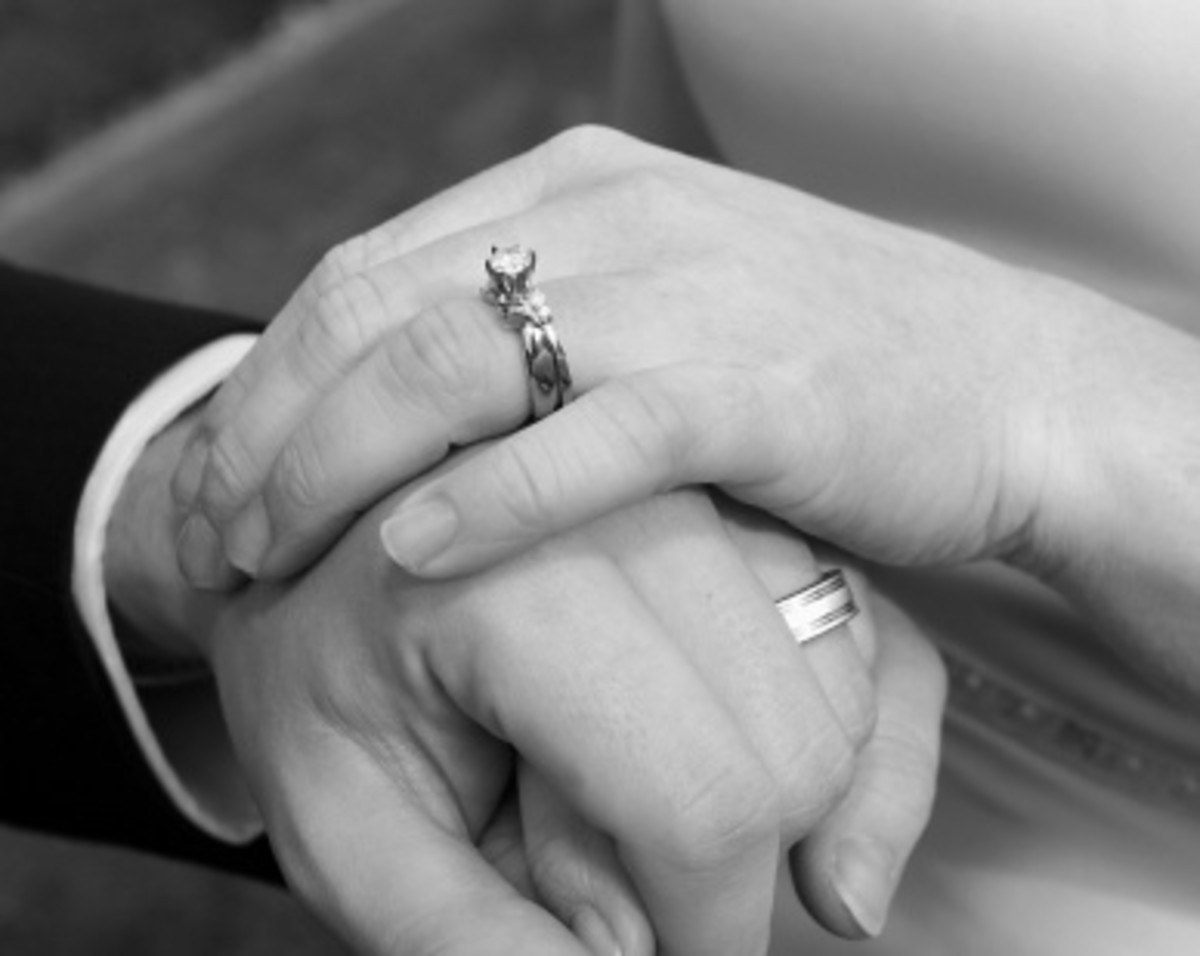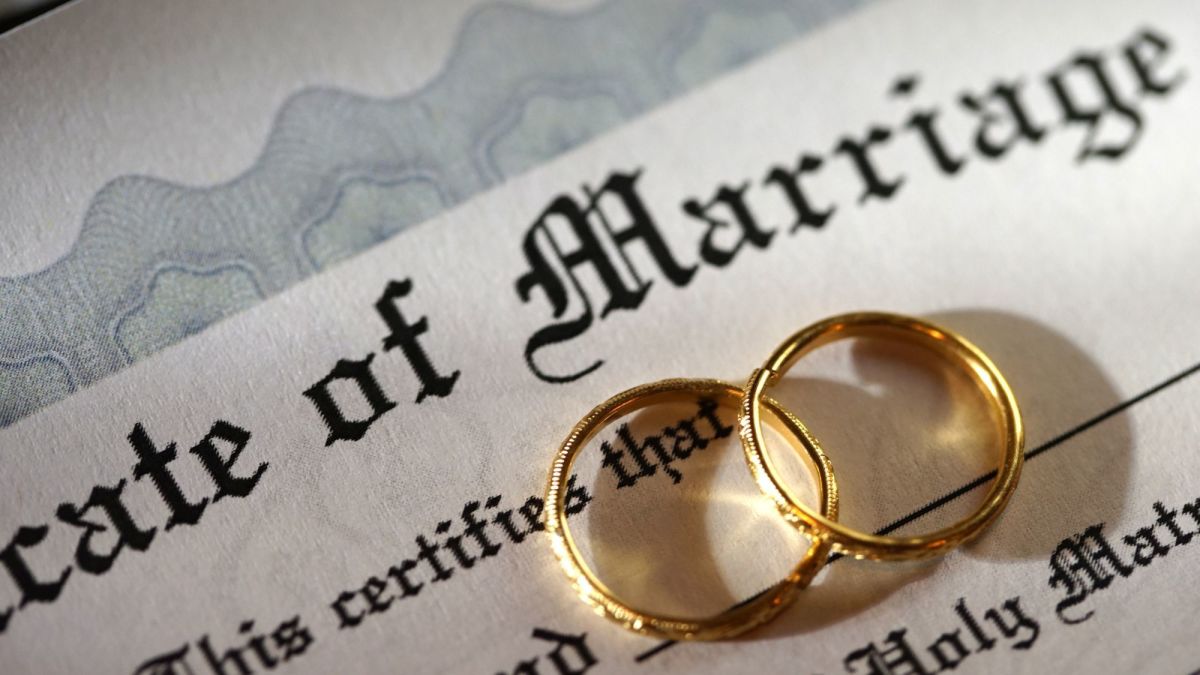An Essay on Young Marriages
Introduction
“Mawage. Mawage is wot bwings us togeder today. Mawage, that bwessed awangment, that dweam wifin a dweam. And wuv, tru wuv, will fowow you foweva. So tweasure your wuv.” According to the Impressive Clergyman in the Princess Bride, marriage is clearly important. People love the idea of marriage. However, people are waiting longer and longer to get married and this increased waiting has proved to be a good thing that strengthens marriages in most cases. So, does that mean that people who do not wait, those who are getting or want to get married earlier, as early as nineteen and into their early twenties are doomed? Not quite. It is very possible that marriages that occur at younger ages can be a great thing, not only for the individuals, but for the nation as a whole. However, the problem is that these young marriages are disappearing and being frowned upon where they still exist. People are skeptical about young marriages, but should they be?
Background on Marriage
Marriage has been an important part of almost every culture practically since the dawn of time. However, as time goes on, marriage has changed. Marriage has had many different purposes over the years, and people’s reasons for marrying has varied as well. Because the focus of this paper is on marriage in America, our marriage timeline will start when America was first being settled in the mid-1800’s. For a good hundred years, the typical woman’s only goal was to find a man to marry so that she could have a family. A woman was seen as successful only if she could do this. If she was unable to do so, something was wrong with her and she would have likely been socially shunned to an extent. At this time, marriage was not only a social goal and sign of success, it was necessary for economic support as well. Jobs for women in this era were scarce so finding a man to support her was imperative. From the time these women were young girls they were trained to be housewives, learning things such as cooking, cleaning, sewing and other domestic tasks so that a man would find them to be a suitable wife some day. Very few went to school early on, and if they did it didn’t last past 8th grade. As time went on, however, more jobs for women were opening up and education was expanding for them. Once high school was something that everyone did and more women were going to college, women experienced more independence. In the 1950’s, the golden age of the nuclear family consisting of a breadwinner husband, a stay at home mother and 2.5 children was at it’s peak. However, there was an unrest underlying the image of the perfect wife. Women were getting restless and longing for more than being housewives. This lead into the huge movement in the 1960’s for abortion and birth control. This decade sought to break traditional social roles and change social norms regarding sex, among other things. Since then views about abortion, sex before marriage and marriage itself have changed dramatically.
A Young Engaged Couple

Why Young Marriages Have Trouble
In today’s culture it is socially acceptable to have sex before marriage, in fact, it’s practically encouraged. 90% of Americans have sex before marriage. This fact is part of the reason the marriage age is rising. Before, sex before marriage was widely condemned largely due to the fact that much of the nation was made up of conservative Christians. Now, there are a lot less of these conservative Christians, which resulted in sex before marriage being less condemned. This new sexual freedom has grown more and more acceptable as time has gone on, leading to the realization that one need not get married for sex to be acceptable. Sex has also become more recreational, leading to hook-ups, one night stands and shorter, less permanent relationships. This doesn’t mean that sex before marriage is ruining the institution of marriage, however studies do show that the more partners one has before they are married correlates to less happiness later on in marriage. Before, having a relationship was what lead to sex, but now, it is sex that is leading to relationships. Part of the big problem with young marriages, and perhaps just marriages in general, is that their relationships are often founded in sex rather than in a good friendship and deep relationship. Many couples who do get married young have strong religious backgrounds. This makes sense because most religions, especially Christianity, discourage sex before marriage. Therefore, when a couple wants to have sex, they feel like they have to get married to do so. This leads a lot of couples to get married just so they can have sex, or because they already have and are feeling condemnation from those around them. This situation is a dangerous one that can lead to someone being married to someone else that they don’t truly love or belong with. They get married out of immaturity so that later on, after they have matured they realize that they don’t want to be with that person any more and get divorced.
Proposal

Young Marriages and Divorce
Studies have shown that as young marriages are being discouraged, the divorce rate has dropped, eliciting the idea that many of the divorces that were happening were among those who married young, which in turn elicits the idea that getting married young leads to divorce. It ends up being a cycle that feeds into itself. Less young people get married, the divorce rate drops, people think it’s only because of less young marriages and less people get married young and the cycle starts again. However, there are many reasons that the divorce rate has dropped. People get married less in general and the economy is bad, as well. Some couples would be fine if they married young, but these couples aren’t making that commitment because of the fear of divorce. This fear of divorce and lack of marriage has lead to what the National Marriage Project has called The Crossover. It used to be that couples had children after they were married, but now, the majority are having kids before they get married. They call this a crossover because as the age of marriage increases, one would expect the age at which people have children to increase at a similar rate, but this is not the case. While the marriage age has risen steeply and steadily, the age of childbearing has risen more slowly and less dramatically. This Crossover is leading to less stability in families across the nation. Children are being raised in single parent, or cohabiting households. Kids in these households are proving to be less successful and more problematic than children being raised in a home by their married biological parents. If these people were less fearful of divorce, perhaps they would have gotten married before having children resulting in more stability overall.
Why Else are People Waiting?
Besides waiting because sex is more available and acceptable, people are also waiting simply because they want to get their lives in order before entering into such a serious commitment. Part of this also has to do with the increased value of individualism and independence in America. People are encouraged to think of themselves more and to do things on their own. It has become a culture of “me” instead of “we”. “I have to finish school, I have to get a job, I have to make enough money, I have to take care of myself.” Society tells people that they are better off if they don’t need to depend on anyone, that having to depend on someone else is a sign of weakness or something of the like. In response to this, people try to be more independent in many ways, including postponing marriage until they can prove that they don’t need anyone else to survive. They also don’t want to get married because they want to focus on themselves instead of having to spend time, attention and money on another human. While this is not a bad thing all around the board, it can make marriages harder when they do end up getting married because in marriage they will have to share responsibilities, money, decisions, etc. with their spouse which would be more difficult after many years of living independently with individualistic ideals.
Poll
Do you think young marriages are a good idea?
Happily Together

What Would Make Marriages More Successful
All in all, it comes down to personality and who the person is when it comes to waiting or not. In the survey conducted for this paper, the majority of respondents said that it depends on the person as to whether or not young marriage is a good idea. Some people were made to wait and others were not. If this is true, then why should young marriages be looked down upon? The answer is that they shouldn’t be looked down on any more than a regular marriage. People care too much about people getting married young and not enough about those who wait. If anything, any marriage at any age should be a big deal. However, the reality is that when two young people want to get married they are heavily questioned and people are skeptical about their marriage, whereas those who wait are hardly questioned at all and people simply accept their decision. The decision to marry should be regarded as a big decision no matter when it is. One thing that would help marriages in general is marriage and family education. If all couples were required, regardless of age, to attend some kind of marriage and family education and counseling before they could legally get married, marriages would likely be more successful. One of the big problems with marriages, especially, although not limited to, young marriages, is that the couple has unrealistic expectations about marriage and do not know what they are getting into. In the survey, this was one thing that many couples mentioned as being important before a marriage takes place: knowing what they’re getting into. Of course, no couple will fully know what they are getting into before they actually experience it, but those with more realistic expectations are more likely to fare better.
Benefits of Young Marriage
One thing that makes a nation work, that makes a nation great, is having a variety of people to do a variety of things. This idea ties in with the functionalist view of sociology. Different people perform different functions in society. Marriage has a function in society, but even more than that, young marriage has a function. America needs people to get married young just as much as it needs people to wait. It needs some to wait because those who wait are likely to be more career focused since they don’t have other people that they need to focus on. These people who wait are also needed because they will have more money sooner to help stimulate the economy. America also needs some people to not wait. If a couple is truly in love, their marriage would mean added stability to the nation because their marriage would be stable, their family would be stable and the future American citizens would have a stable background leading to a more successful future. The problem is that many of these couples are being discouraged from getting married because of too many unwise people, to put it nicely. These unwise people are the ones who rushed into marriage for the wrong reasons and ended up divorced. Because of these unwise people, those who are young and want to get married often wait simply because it’s what society has come to expect, whereas they would be better off if they went ahead and got married, even if they wanted to continue education and work towards careers. So, this is not to say that those who wait will be unstable in their marriages and families, and those who marry early won’t get good jobs or make a lot of money. What it is to say is that in each generation these things need to be happening at a variety of times so that neither area, families nor careers, will be lagging at any point in time. While some are working towards careers, others are more focused on their families. Many of the people who participated in the survey for couples who got married young had college education and good careers started or on the way. They reported that being married in the midst of such situations worked for them because they had encouragement, constant companionship and support from their spouse which helped reduce stress and motivate them. The reason that America needs young marriages is because America, just like any other society, is full of a variety of people. Some people would rather accomplish something completely on their own, but others would rather have help. The reason that there is so much instability among the less educated who are waiting for marriage could be that these are the kinds of people who would thrive more with a good support system provided by a spouse. These less educated would also fare better if they went ahead and got married because marriage would mean more money to live off of because of combined incomes. Also, studies have shown that married men are seen as more responsible and can get better jobs. This makes sense compared to a single man because the married man is not just working for himself, he is working for his family. He is more likely to do a better job because he isn’t the only one dependent on his income. A single man will be willing to take more time off, work less and not seek promotion as avidly because he would be seen as more able to live off of less since he is the only one who would have to sacrifice. Thus, young marriage also helps the economy.
The purpose of this essay is not to say that everyone should get married young, nor should everyone wait. Rather, there should be a healthy divide between both. If a young couple wants to get married, instead of facing criticism, people should come alongside them to support them and help lead them into a healthy marriage. If someone wants to wait to get married, they too should be supported and encouraged to finish college and get a career. The point is, whichever path one chooses, he or she should be encouraged or discouraged from certain things based on the path they choose, not the path anyone thinks they should take.
From My Research
My question is whether or not people should really be so worried about young people getting married. I believe that young marriages are just as healthy as any other marriage. To try to prove this, I interviewed some people who got married young, and obtained additional information through surveys. What I found, in my opinion proved that my hypothesis is correct, marriage is marriage, no matter what age you are. When people get married there will be ups and downs. Yet, the young people who were married seemed just as well off as those who wait.
Of those who married young, most either had a college education or were pursuing one. One of the biggest arguments against young marriage is that education will be stunted. My research shows that education among these young marrieds has not been significantly stunted. While a few have decided to postpone it, they still say that they plan on going to school in the future. My proposal is that it is not marriage that stops education, rather it is children and children can happen whether one is married or not. The biggest reason people quit school is because they became a parent and could not afford college either financially, timewise or both. However, this does not have much to do with marriage, at least not these days since most people get have kids before they get married anyways. Plus, values have a lot to do with this as well. Of the couples that were interviewed, some had quit school because of having children. However, to those that did, having a family was one of their biggest goals in life. So, because of their high value on having a family, they were willing to forego more schooling. Nonetheless, those that had a higher value on schooling finished or planned on finishing college. Therefore, the argument that getting married hinders education is false. Furthermore, of those interviewed who were married while in school, all said that being married helped them a lot. Although, when asked what their biggest struggles were, quite a few reported that being in college and being married was one of their biggest struggles. It caused them to struggle financially, socially, timewise and added stress. But, despite it being a struggle, it was not an impossible struggle by any means. It was merely a big struggle that ultimately brought them closer together and was worth it in the end. Many fear that marriage interferes with schooling, but in reality schooling can interfere with marriage more than the other way around. While this may still sound like a bad thing, I believe it to be better. If the marriage were interfering with schooling, the school would not be able to do much about it, but when schooling interferes with a marriage because of the time commitment, stress levels or any other reason, the other person in the marriage is able to work things out with their spouse. These spouses can also encourage and support each other in their studies. If both are in college they can study together. If one is in college and one is out of school, the one out of school can advise the one in college. If one is in college and the other simply is not, the other can still provide much encouragement and motivation. Another reason that being married while still in school is good is that there is always someone to hang out with. Many of the people I interviewed said things along these lines. When no one else was available, they always had each other and they were never lonely. The only downsides of being married and going to school were conflicting schedules and being a minority on campus. Most college students aren’t married and that makes it hard for a married person to relate to their peers. However, overall, marriage seemed to benefit educational experiences more than hinder them.
One common misconception about young marriage is that all of these couples just rushed into marriage instead of taking the proper amount of time needed for the relationship. Despite this misconception, most of the respondents said that they feel the opposite is true. Only one responder claimed that they felt rushed into marriage, while all of the rest said they felt it had been well paced and that marriage came right when it needed to. There was no problem with the timing for them. While the time that these couples dated and were engaged varied from a few months to a few years, almost all of them said that they felt like the timing was perfect. Part of the problem is that those critical of young marriage hear that these couples only dated for a seemingly short amount of time and automatically think that it was rushed. What they fail to realize is just how much can happen in a short time. Time is not only measured by days, hours and minutes, time is also felt and perceived. So, while the measurement of time seems short, the perceived time by the couple seemed longer and like the right amount for them. This goes back to the idea that all people are different. For some, getting married after only 6 months of dating would be way too fast, while to others only 3 months or less would have been sufficient for them. This is in part due to the fact that the majority of these couples had known each other longer than the time that they dated and were often good friends before their romantic relationship as well. Whether the couple dated for a long time or not, almost all felt like the timing was perfect and they wouldn’t have it any other way. When asked if they wish they had waited, the vast majority said no, they are happy with their decision and feel like it was the best for them. They say they have benefitted greatly from their marriage.
One of these benefits of getting married young that was widely reported by the participants was being able to grow with someone. All that were married young said that they were able to learn, grow and mature with their partner. They said that it was very special to be able to see the other grow in wisdom and other such things. That means, one downside of waiting to get married is that there is less opportunity to see such changes that happen over time, often because the biggest revelations would have happened before the couple even met. Being able to grow in such ways with someone else creates a strong bond between the couple, which leads to more stability in the later years. Besides just being able to mature and learn together, being with a spouse at a young age gives the couple more insight during those years than those at the same age who are not married. These young couples are able to think and discuss things together instead of having to figure things out all by one’s lonesome. This can lead to more growth faster than just one person on their own. Surely, being married will mature a person very quickly. Marriage requires people to learn how to get along, how to be selfless and how to compromise, all very important qualities to learn. While all married couples have more opportunity to learn these things compared to singles, those that marry young learn these things much sooner, which could help them in the long run.
Among the responses, there was a variety of trends. One trend occurred on what people thought couples needed for their marriage to really work. These things include having a common faith, being grounded in reality, being responsible in a variety of ways and having maturity. While couples reported that even they didn’t have all of these things when they first married, they still believe them to be important and that having any of these things would make life at least a little easier for the married couple. Another trend that couples noted was their sources of support. Most said things along the lines of family, friends and God. God was said to be the biggest and best support in almost all of the responses. Many said that if it was not for God, they would not actually be together at all.
Conclusion
That being said, getting married young is definitely feasible. There are many benefits and other gains, despite some of the struggles and costs. Different people want different things, and if a couple wants to get married young I think that they should go for it. If they have found the one that they want to be with there shouldn’t be any stipulation against their marriage. Their marriage will likely benefit them, their family, their community and even the nation. Still, not everyone should get married young and not everyone should wait. Responders said that it definitely depends on the person and the couple, however most also noted that if someone has found their match, they should go for it as soon as they feel ready if they are able to do so. People should not worry so much about couples getting married young. While there are examples of it dissipating and causing turmoil, there are also many encouraging examples of happily married couples who tied the knot in their youth. These couples range from newly wed to those who have been married for 6, 19, 32 and even 51 years. The majority of all of these couples reported high happiness and satisfaction at all of these different milestones in their marriages. Surely, young marriage can very well be a good idea, and it is my hope that someday getting married young will again increase in popularity so that those who do want to get married young will not be so criticized and discouraged. After all, “mawage is wot bwings us togeder today,” not just the couple and their families coming together, not just the guests coming together at the ceremonies, but the communities and the nation are brought together by marriage, and no one should feel deferred from such a “bwessed awangment” no matter what their age.
Sources
Cited Sources
-
Why Marriages Succeed or Fail by John Gottman, Ph.D.
-
Not Quite Adults by Richard Settersten, Ph.D. and Barbara E. Ray
-
Knot Yet
-
Before I Do
-
President’s Marriage Agenda 2012
-
Institute for American Values
-
Trends in Premarital Sex in the United States, 1954-2003








